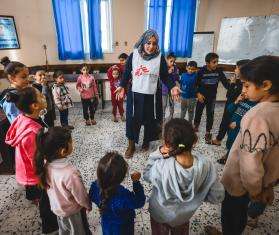BOENDE, DEMOCRATIC REPUBLIC OF CONGO/BARCELONA—The Ebola outbreak that began in August in the north of the Democratic Republic of Congo (DRC) is now under control, with no new cases detected after the last confirmed infection on October 4 in the town of Boende, Equateur province, the international medical humanitarian organization Doctors Without Borders/Médecins Sans Frontières (MSF) said today.
MSF has withdrawn its teams from the affected area after deploying about 70 staff members in response to the outbreak, which is separate from the Ebola outbreak in West Africa. However, MSF staff members continue to monitor the area, after working for weeks to enhance the capacity of local authorities to respond to any eventuality. According to the World Health Organization, the outbreak in DRC infected 66 people, 49 of whom died.
"At MSF, we try our best to ensure an effective and forceful response in the event of a new outbreak," said José Mas, coordinator of MSF's intervention. "In Congo, we have worked with local authorities to maintain an operational treatment center in Equateur. We have also made a donation of medicines and equipment for water and sanitation, and the staff is the same that has worked during this last outbreak, so they are properly trained."
Closing an Ebola intervention includes two phases. There is a first period of 21 days after the last confirmed case, during which people who had been in contact with the patient are traced. That is followed by a second 21-day buffer period to ensure no additional cases arise. An Ebola outbreak is typically considered over after 42 days without a case.
Despite the withdrawal, MSF has teams stationed in other parts of DRC that can return to the area in the event of a new Ebola alert. One team is in the nearby city of Mbandaka, by the Congo River, from which an emergency response can be activated if necessary.
The MSF intervention began in July, when a survey team was sent to confirm the presence of Ebola in the area. After the outbreak was officially declared, MSF set up two treatment centers in collaboration with the Congolese government in the towns of Lokolia and Boende. Of the 65 people admitted to the centers, 25 had confirmed Ebola infections. Thirteen people recovered and 12 people died.
The MSF teams also performed contact tracing, ultimately tracking more than one thousand people, disinfected houses, and supported safe burial practices.
A very important task was the sensitization of the local community about the risks of the virus.
"Fear is always a problem in an Ebola outbreak, and there is a lot of misunderstanding, rumors, and misinformation,” said Segimon Garcia, an anthropologist and coordinator of the MSF health promotion team. "Information is precisely what it takes to understand the disease and cope with the epidemic."
The usual fears aroused by any Ebola epidemic have been accentuated by the huge outbreak in West Africa. The potential economic effects of government actions to tackle the epidemic created concern and caused rejection among the local population.
Unlike the situation in the west of the continent, the outbreak in DRC — the seventh in this country — is considered a classic one by experts since it was located in a remote area far from urban centers.
"In Congo, there had previously been several Ebola outbreaks but they were curbed because they were in the middle of the jungle, among other reasons," said Núria Carrera, MSF coordinator at the Boende treatment center. "Distances are greater there, transportation is more difficult, and people cannot move that much, so the outbreak remains limited and contamination is more difficult. In these conditions, the risk of dissemination of the virus is much lower."
In addition to the geographical factor, there was also an appropriate response that managed to contain the epidemic in an early stage.
"Containment measures such as contact tracing, an alert system and the medical care of the patients were taken at the right time," said Mas.





